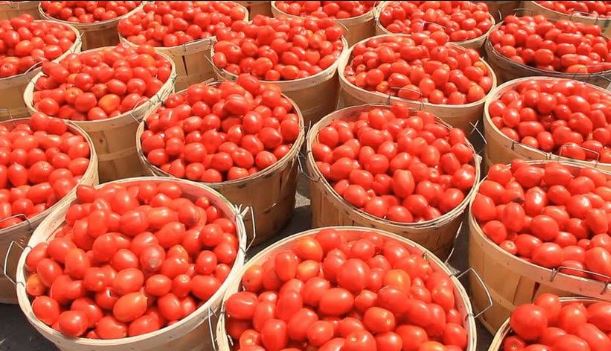Decades of abandoned factories, unfulfilled policies, and wasted harvests leave farmers helpless and Ghana’s food security at risk.”
Ghana is blessed with fertile soil and hardworking farmers, yet across the country, the harvests are turning into heartbreak.
In Anloga, tomato farmers watch their labor rot under the sun as market prices collapse, with a box that once sold for GH¢1,050 now barely fetching GH¢70 (Citi Newsroom, 2025). In Ziope, Michael Agbobli recounts weeks of labor and money spent on fertilizers, yet much of the crop goes unsold (ResearchGate, 2015).
Similarly, maize farmers in Sissala stare helplessly at mountains of harvested maize, while in Oti and Sunyani, yams, maize, and poultry slowly decay because there are no processing facilities to preserve them.
This nationwide predicament illustrates a harsh reality: Ghana produces food but lacks the industrial infrastructure to process or market it efficiently.
Consequently, billions are spent importing what the nation already grows. To understand why, one must look to the ambitions of the nation’s past leaders.
Decades ago, Kwame Nkrumah envisioned a Ghana where farmers would not toil in vain, where crops would move seamlessly from fields to factories, and where industrialization would complement agricultural abundance.
To realize this vision, state farms were established across the country—Ohawu, Kpeve, Akatsi, and Akuse—supplying produce to industrial complexes. The Pomadze Poultry Farm produced layers and broilers, while the Nsawam Cannery turned tomatoes and pineapples into processed goods. Similarly, the Wenchi Tomato Factory handled tomatoes, garden eggs, and okra, and in the north, the Bolgatanga Meat Processing Factory produced corned beef for local and export markets.
Amrahia Dairy Farm ensured milk reached the markets, while Juapong and Akosombo Textiles, the Kade Match Factory, and the Ghana Glass Factory in Aboso and Tarkwa supported the industrial ecosystem (GhanaWeb, 2016; Africa for Afrikans, 2016; The Ghana Report, 2025).
Yet, political instability and neglect eroded this ambitious blueprint. While Nkrumah had linked farmers to factories, subsequent decades saw many of these facilities fall into disrepair, leaving farmers to struggle with post-harvest losses and minimal market access.
Today, as tomatoes rot in Anloga or maize decays in Sissala, the lesson is clear: production alone is insufficient without infrastructure and policy continuity.
Building on this legacy, General I.K. Acheampong’s
Operation Feed Yourself (1972–1978) sought to make Ghana self-sufficient in food (Wikipedia, 2025). The program initially spurred production, yet inadequate processing, storage, and market access meant much of the excess produce still went to waste.
Later, governments under Rawlings (1981–2001), Kufuor (2001–2009), Atta Mills (2009–2012), and Mahama (2012–2017) introduced policies and programs such as liberalization, private-sector agribusiness support, irrigation development, Feed Ghana, and One District, One Factory (1D1F) (World Bank, 1990; FAO, 2005; Ghana Government, 2017).
Despite these efforts, farmers’ cries echo across the country. In Anloga, tomato farmers lament:
“We have produced more, yet there is no market to sell. The government must come to our aid.”
In Sissala and Ziope, maize and yam farmers watch crops rot due to lack of processing facilities. In Sunyani, poultry and egg producers cannot store excess eggs beyond a few days, resulting in massive financial losses (ResearchGate, 2015).
Compounding the crisis, Ghana’s agricultural system remains heavily rain-fed, relying on erratic weather, with minimal irrigation. Neglected schemes such as Afife, Dawenya, Tono, Vea, Kpong, and the White Volta Irrigation Project leave farmers vulnerable to droughts and floods (Ministry of Food & Agriculture, Ghana, 2019). Without proper storage and cold-chain facilities, post-harvest losses threaten both farmers’ livelihoods and national food security—a reminder that “you cannot fill a basket with a hole in it.”
In recent years, initiatives like Planting for Food and Jobs (PFJ, 2017–2020s) increased yields (Ministry of Food & Agriculture, 2020), while 1D1F promised factories in every district (Ghana Government, 2017). The ongoing Feed Ghana / Reset Agenda (2025–) emphasizes value addition, Farmer Service Centres, and youth agribusiness. Yet, the gap between policy and implementation remains stark, as factories continue to lie idle, crops rot, and billions are spent importing what Ghana already grows.
Post-harvest losses remain staggering:
45–60% of fruits and vegetables are lost (FAO, 2011), Ghana spends over $3.25 billion annually on food imports (Ghana Statistical Service, 2023), and 70% of Nkrumah-era factories lie abandoned (Starr FM, 2025). Less than 30% of state farms remain operational.
Policymakers must now confront pressing questions:
Can Ghana renovate idle factories instead of promising new ones? Can programs like the school feeding initiative procure exclusively from local farmers? Why do factories remain rotting while slogans dominate policy speeches? How can Ghana transition from taxation to production while aligning industrial policies with agricultural output? How can climate risks be mitigated while processing and storing excess produce efficiently
Recommendations
To address these pressing challenges, Ghana must first revive and renovate its idle factories, including Nsawam Cannery, Bolgatanga Meat Factory, Wenchi Tomato Factory, and Pomadze Poultry Farm, which once supported the nation’s agricultural-industrial ecosystem. By restoring these facilities, the nation can process crops that currently go to waste, reminding us that “he who builds a house without finishing it invites the rain inside.”
Moreover, the government can prioritize local markets by ensuring school feeding programs, hospitals, and other state procurement initiatives purchase directly from local farmers. This would create reliable and guaranteed demand, reduce waste, increase farmers’ income, and strengthen national food security. Simultaneously, investment in irrigation systems, including Afife, Dawenya, Tono, Vea, and Kpong, is crucial to mitigate the vulnerability of farmers to erratic rainfall and climate change. Once operational, these irrigation systems would ensure consistent yields throughout the year, linking agricultural production with industrial processing.
In addition, cold-chain and storage infrastructure must be developed.
Modern storage facilities and improved processing capabilities can preserve perishable crops like tomatoes, yams, and vegetables, drastically reducing post-harvest losses. Similarly, policy continuity and integration is essential; agricultural policies must link production, processing, storage, and market access to avoid cyclical waste. Furthermore, providing education and technical support to farmers, particularly in value addition, mechanization, and post-harvest management, will ensure sustainability.
Ultimately, these measures require coordinated action, political will, and consistent oversight. As the Bible reminds us, “The hand of the diligent makes rich, but the lazy man’s hands make poverty” (Proverbs 10:4). Without decisive intervention, Ghana risks leaving its fertile lands and hardworking farmers at the mercy of weather patterns and broken promises. Truly, “a nation that eats what it does not grow is a nation that borrows its survival.”
Farmers across Ghana send a unified message:
“We don’t care what you call it—OFY, PFJ, 1D1F, Reset. Just make sure our produce doesn’t rot.” If the government acts now, Ghana can honor Nkrumah’s vision, secure its food supply, and ensure that decades of toil are not wasted.
By Curtice Dumevor, Public Health, Expert & Social Analyst






